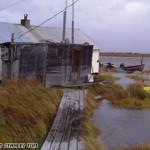contributed by Steven Alloway
Warm-up Question
Have you ever had to prepare for an important event or occurrence in your life? What was it? How did you prepare? Was it a good event, or a bad one?
Doom Looms for Shishmaref, Alaska
From CNN.com
 A warming climate is having adverse effects on the Eskimo village of Shishmaref, Alaska. As the ice melts gradually earlier in the spring and forms later in the fall, the coast is beginning to erode—and the houses built along it are in danger of falling into the sea. One house has succumbed to the erosion already and thirteen more have been moved inland to protect them from meeting the same fate. Only one house remains—that of Shelton and Clara Koreok, only feet from the edge. Shelton refuses to move, no matter what the danger, because he fears that moving would mean losing everything he knows.
A warming climate is having adverse effects on the Eskimo village of Shishmaref, Alaska. As the ice melts gradually earlier in the spring and forms later in the fall, the coast is beginning to erode—and the houses built along it are in danger of falling into the sea. One house has succumbed to the erosion already and thirteen more have been moved inland to protect them from meeting the same fate. Only one house remains—that of Shelton and Clara Koreok, only feet from the edge. Shelton refuses to move, no matter what the danger, because he fears that moving would mean losing everything he knows.
“This is my hometown,” said Shelton. “I don’t want to go anywhere.”
Discussion Questions
- Besides the looming danger for their houses, in what other ways do you think this coastal erosion will affect the people of Shishmaref?
- What do you think the people should do about this crisis? Should they try to prevent further erosion? Carry on in spite of it and find ways of dealing with it? Pack up and leave Shishmaref altogether?
- What do you think of Shelton Koreok’s decision not to move his house inland? What do you suppose he’ll do if his house falls into the sea?
Scripture Texts (NRSV) for Sunday, December 13,2009 (Third Sunday of Advent)
(Text links are to Oremus Bible Browser. Oremus Bible Browser is not affiliated with or supported by the Evangelical Lutheran Church in America. You can find the calendar of readings for Year C at Lectionary Readings.)
For lectionary humor and insight, check the weekly comic Agnus Day.
Gospel Reflection
We’re in the advent season now: the time of preparation for the coming of Jesus. But what does that preparation entail? Reading the Christmas story in our Bibles? Singing “Silent Night” with friends and family? Putting a manger scene under the tree?
Well, according to John the Baptizer, there’s quite a bit more to it than that. John came to prepare the way of the Lord, to get the people of Israel ready for his coming. But he didn’t do it by giving them images of a baby in a manger, surrounded by cherubic angels and a blandly serene Virgin Mary. The preparation he spoke of was for an impending doom. He spoke of unquenchable fire. He called his hearers vipers. He told them to expect wrath and an ax poised to cut them down. Far from the traditional Christmas message. But a necessary message for understanding the coming of Christ.
Jesus came to save us from our sins. So in order to prepare for his coming, we need to think about what sin is and what it means. Sin means condemnation. Sin means unquenchable fire and wrath. In order to be saved, we must recognize our need for salvation. We must be convicted of our sins and realize that the consequences are death and destruction. We are standing on an eroding coast, and if we stay there, we will surely fall into the sea.
But Jesus offers to lead us to safety. He can take us away from the impending doom, and give us a new life with him. But we cannot be saved until we first understand that staying where we are means death, and going with Christ means life. Otherwise, we’re like Shelton Koreok: refusing to leave for fear of losing everything—when really, we lose everything only if we stay where we are.
That’s what repentance is: turning around. We turn from the sinful path we’re on, and instead follow Christ. Jesus came to set us free. His human birth was only the first step. He then lived a human life, and died a human death, just as we do, so that he could save us from the unquenchable fire. Jesus came with a fire of his own: the fire of the Holy Spirit. A fire of life, rather than a fire of death. When we repent of our sins, we are baptized with fire, and the Holy Spirit lives in us. And when the Spirit lives and burns within us, we are able to bear fruits worthy of repentance. But we can only do it if we turn around.
Discussion Questions
- John provides some suggestions for bearing fruit worthy of repentance (share with those who have nothing, be fair with money). What are some other ways that we can bear fruit worthy of repentance in our own lives?
- Even in the face of doom, why do you think some people are reluctant to repent and turn to Christ? What do you think they’re afraid of losing?
- How can we help others this Christmas season to understand what it means to prepare for the coming of Christ?
Suggested Activity:
Sing, “O Come O Come Emmanuel.” Go through the lyrics one at a time, and talk about what they mean in terms of Christ’s saving us from sin and death.
Closing Prayer:
Lord Jesus, thank you for your saving grace. Thank you for the freedom we have from sin, and our new life with you. As we remember your first coming, prepare our hearts for your Second Coming. Amen

 The National Aeronautic and Space Administration (NASA) along with Jet Propulsion Laboratories (JPL) and some partners from other countries around the world have been working diligently to find a way out for a stuck Mars rover named Spirit. Spirit has been stuck for over six months now in an area where the ground is made up of very fine, soft sand. The six wheels (one of them has not been working properly for quite a while now) cannot seem to get the traction needed to move forward in any significant way. NASA is not giving up on Spirit, which along with its twin, Opportunity, has continued to function well for five years longer than the originally planned mission of three months. Teams here on earth are working with sample rovers in artificially created environments trying to recreate the actual conditions in order to find the perfect solution…to find a way out. Some of the attempts range from trying various wheel directions and speeds, to having Spirit try to dig itself out with its robotic arms. Just before the Thanksgiving Day weekend, Spirit was commanded to move its wheels forward. NASA indicated that the rover completed a spin which should have equaled a total of 13 feet. The rover actually only moved 0.2 inches forward, 0.1 inches to the left, and 0.1 inches further down into the sand.
The National Aeronautic and Space Administration (NASA) along with Jet Propulsion Laboratories (JPL) and some partners from other countries around the world have been working diligently to find a way out for a stuck Mars rover named Spirit. Spirit has been stuck for over six months now in an area where the ground is made up of very fine, soft sand. The six wheels (one of them has not been working properly for quite a while now) cannot seem to get the traction needed to move forward in any significant way. NASA is not giving up on Spirit, which along with its twin, Opportunity, has continued to function well for five years longer than the originally planned mission of three months. Teams here on earth are working with sample rovers in artificially created environments trying to recreate the actual conditions in order to find the perfect solution…to find a way out. Some of the attempts range from trying various wheel directions and speeds, to having Spirit try to dig itself out with its robotic arms. Just before the Thanksgiving Day weekend, Spirit was commanded to move its wheels forward. NASA indicated that the rover completed a spin which should have equaled a total of 13 feet. The rover actually only moved 0.2 inches forward, 0.1 inches to the left, and 0.1 inches further down into the sand.